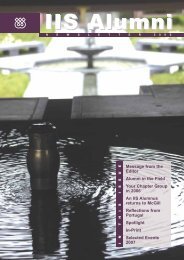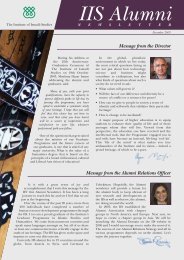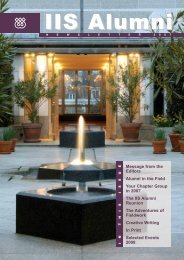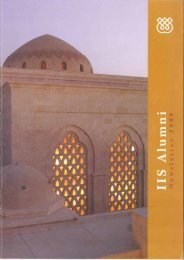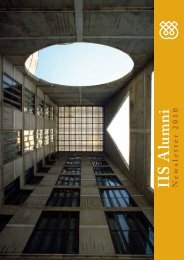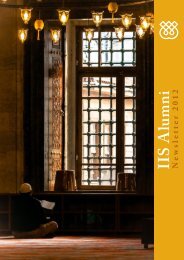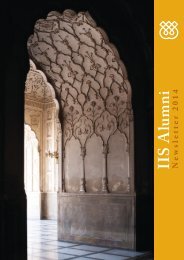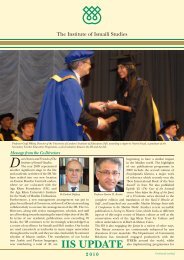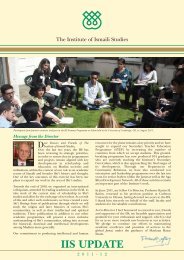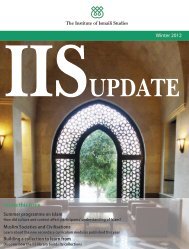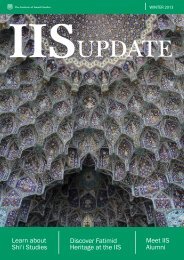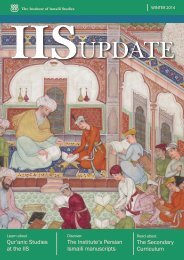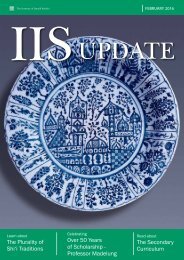IIS Alumni Newsletter 2015
- No tags were found...
Create successful ePaper yourself
Turn your PDF publications into a flip-book with our unique Google optimized e-Paper software.
<strong>IIS</strong> <strong>Alumni</strong> <strong>Newsletter</strong> <strong>2015</strong>
Messages<br />
Message from the Co-Director<br />
Dear <strong>IIS</strong> <strong>Alumni</strong>,<br />
These are exciting times for the <strong>IIS</strong>.<br />
All our students have now moved<br />
into the AKDN’s purpose-built<br />
student accommodation in the<br />
King’s Cross area of London. The<br />
students’ feedback is overwhelmingly<br />
positive — they are all delighted.<br />
With this move, we hope that the<br />
learning experience at the <strong>IIS</strong> will<br />
be enhanced even further.<br />
This year we organised our first-ever PhD seminar at<br />
the <strong>IIS</strong>. It brought together twelve recipients of the <strong>IIS</strong>’<br />
Doctoral Scholarship who are currently pursuing their<br />
studies. All heads of department and units mingled with<br />
the students and shared with them the main objectives<br />
of the various programmes and activities of the <strong>IIS</strong>. The<br />
participants’ presentations covered subjects related to a<br />
wide geographical spectrum — from Syria to Tajikistan,<br />
from Iran to the Subcontinent. It is also interesting to<br />
note that the subjects covered at the seminar reflected the<br />
diversity of research interests of the <strong>IIS</strong>: history, education,<br />
manuscript studies, philosophy and theology, ethics,<br />
literature, anthropology and sociology of religion, aural<br />
traditions and material culture.<br />
Another important <strong>IIS</strong> project that will be of interest to<br />
the alumni is the Ismaili Heritage Programme. After some<br />
years of preliminary research, the <strong>IIS</strong> has entered into a<br />
collaborative relationship with AKTC and DJI to map and<br />
document (and ultimately, whenever appropriate, make<br />
provisions for selective restoration) of all sites related to<br />
the history of the Ismailis and the Imamat across the<br />
globe. This is a wonderful opportunity for the alumni to<br />
get involved and contribute to these research efforts.<br />
As you may know, the family of the late Professor<br />
Mohammed Arkoun donated his personal archive<br />
to our Library. Now, with the help of a professional<br />
archivist, we are cataloguing this important collection<br />
that documents the intellectual trajectory of this eminent<br />
Muslim scholar. All alumni are invited to donate to this<br />
archive materials that they may have related to Professor<br />
Arkoun (photographs, papers, recordings, and so on). It is<br />
hoped that the final catalogue will be made available to<br />
researchers through our website.<br />
On a related note, we have also initiated a Manuscript<br />
Analysis Project that aims not only to complete the<br />
cataloguing of all our manuscript holdings but also to<br />
assess the contents of our collections and their significance.<br />
<strong>Alumni</strong> are welcome to participate in this analysis project,<br />
as we are inviting scholars to explore our collections and<br />
give us detailed feedback on their findings on individual<br />
manuscripts.<br />
Finally, a reminder that the <strong>IIS</strong>’ mission, whether it be its<br />
academic and research outlook, its educational endeavours<br />
or its commitments to the Ismaili community, is a work that<br />
is carried out both in London and by all of you, in your<br />
own institutions and countries as well as in your various<br />
fields of endeavour. As the work of the <strong>IIS</strong> expands, we<br />
will need you — our alumni — more and more.<br />
Dr Farhad Daftary<br />
2<br />
In <strong>2015</strong>, alumni had the opportunity to explore three cities:<br />
Athens, Konya and Toronto.<br />
• Athens: Generally considered to be the birthplace of<br />
western civilization, Athenian philosophy, architecture,<br />
literature and political ideals are bequests to the world.<br />
• Konya: As the capital of the Seljuk sultanate in the<br />
eleventh and twelfth centuries, Konya reached the<br />
pinnacle of its prosperity and was considered one of<br />
the brilliant cities of the world.<br />
• Toronto: Since the second half of the twentieth<br />
century, Toronto has grown phenomenally, from a sedate<br />
provincial town to the most populous metropolitan city<br />
in Canada, and the country’s financial and commercial<br />
centre.<br />
In these cities, they explored the collections of Islamic art<br />
housed in three museums:<br />
• The Benaki Museum’s collection of Islamic art,<br />
comprising over 8,000 artworks, ranks among the most<br />
important in the world.<br />
• The Tekke of Rumi, comprising a number of<br />
buildings and the mystic’s mausoleum has, since 1917,<br />
been used as a museum.<br />
• The Aga Khan Museum is the first museum in North<br />
America devoted entirely to showcasing Islamic art.<br />
The museums and their<br />
collections not only represent<br />
the cultural patrimony and<br />
artistic heritage of Muslim<br />
civilisations, but also exemplify<br />
knowledge and enlightenment,<br />
signifying connections across<br />
time and linking us to the past.<br />
I am happy to report that 98%<br />
of alumni responded to the<br />
annual survey and would like to say a big thank you to all<br />
of them! Among the interesting outcomes of this survey<br />
is that we have an expansive set of linguistic abilities –<br />
with speaking and writing skills in nearly twenty-five<br />
languages. As well, more than 60 alumni have expressed<br />
an interest and willingness to undertake professional<br />
projects in their country of origin. It is our hope that<br />
in 2016 there will be more opportunities for alumni to<br />
contribute to <strong>IIS</strong> projects, some of which are highlighted<br />
in Dr Daftary’s message. As always, I would like to take<br />
this opportunity to welcome new alumni and wish them<br />
the very best as they begin their careers. Congratulations!<br />
Shellina Karmali, <strong>Alumni</strong> Relations Coordinator
Asian Chapter Group<br />
Chapter Groups - Asia Europe North America<br />
<strong>Alumni</strong> from across Asia met in Konya, Turkey, for their annual meeting on 28–30 March. The meeting brought together<br />
32 alumni to explore “Esoteric Traditions in Islam: Past and Present Manifestations”. Speakers included Dr Toby Mayer,<br />
Dr Orkhan Mir-Kasimov, Dr Leonard Lewisohn and Mr Shiraz Kabani. <strong>Alumni</strong> took the opportunity to visit the shrines<br />
of Shams Tabriz and Jalaluddin Rumi, in addition to other important sites.<br />
3
European Chapter Group<br />
Chapter Groups - Asia Europe North America<br />
<strong>Alumni</strong> from across Europe met in Athens, Greece, for their annual meeting on 19–21 May. The meeting brought together<br />
37 alumni to explore “The Translation Movement between Greek and Arabic Philosophy”. Speakers included Professor Syed<br />
Nomanul Haq (Professor of Humanities, Institute of Business Administration, Karachi), Professor Peter Adamson (Professor<br />
of Late ancient and Arabic Philosophy, Ludwig-Maximilians University, Munich), Ms Mina Moraitou (Curator, Benaki<br />
Museum of Islamic Arts, Athens), Dr Laila Halani (Head, Department of Graduate Studies, <strong>IIS</strong>) and Mr Shiraz Kabani<br />
(Head, Department of Community Relations, <strong>IIS</strong>). Dr Aziz Esmail, Governor, <strong>IIS</strong>, delivered a Keynote Address. <strong>Alumni</strong> had<br />
an opportunity to have a walking tour of Islamic Sites in Athens and to visit the Benaki Museum of Islamic Art.<br />
North American Chapter Group<br />
4<br />
<strong>Alumni</strong> from across North America met in Toronto, Canada, for their annual meeting on 19–21 June. The meeting brought<br />
together 55 alumni to explore “Celebrating Pluralism and Cultural Diversity: Art, Architecture and Music in the Muslim<br />
World”. Speakers at the conference included Professor Jonathan Bloom and Professor Sheila Blair from the Boston College<br />
of Arts and Sciences, Professor James Wescoat from Massachusetts Institute of Technology, Professor Regula Qureshi and Dr<br />
Karim Gillani from the University of Alberta, and Dr Henry Kim, Ms Ghazaleh Rabiei and Mr Amirali Alibhai from the Aga<br />
Khan Museum. <strong>Alumni</strong> showcases featured Mr Alnoor Kassam (Class of 1991), Professor Karim H Karim (Class of 1984),<br />
Dr Zulfikar Hirji (Class of 1997) and Ms Sehr Tejpar (Class of 2012). Mr Shiraz Kabani (Head of Community Relations, <strong>IIS</strong>)<br />
gave his presentation via video link. <strong>Alumni</strong> had an opportunity to visit the Aga Khan Museum and tour both the Aga Khan<br />
Park and the Ismaili Centre.
<strong>Alumni</strong> Association Central Executive Committee attendees<br />
<strong>Alumni</strong> Lecture Series: Dr A Iloliev in conversation with Dr Y Baiza<br />
Cultural Connections<br />
ACG meeting: <strong>Alumni</strong> in conversation at the Shams Tabriz Mausoleum<br />
ECG meeting: <strong>Alumni</strong> engaged in a team building activity<br />
NACG: <strong>Alumni</strong> actively listening to various speakers<br />
5
The first PhD Seminar for the <strong>IIS</strong> Doctoral Scholarship<br />
recipients was held at The Institute of Ismaili Studies on 23<br />
-24 October (http://iis.ac.uk/news/phdseminar<strong>2015</strong>). The<br />
event was hosted by the Department of Academic Research<br />
and Publications in collaboration with the <strong>Alumni</strong> Relations<br />
Unit. The seminar provided a platform for the participants<br />
to network, share knowledge and information, and learn<br />
more about the work of the <strong>IIS</strong> and how they can further<br />
contribute to its work.<br />
Ten current scholarship recipients, who are at various stages<br />
of their doctoral studies, and two past recipients who have<br />
completed their PhDs gave their colleagues an overview<br />
of their individual research areas. Subjects covered by the<br />
presenters included alternate views of ethics in Islam, hadith<br />
literature, study on the recent history of Salamiyya, places of<br />
worship, and artistic and musical expressions.<br />
literature. The geographical spectrum reflects the breadth of<br />
interest of the <strong>IIS</strong>, from Syria to Central Asia, from Iran to the<br />
Sub-Continent.”<br />
Many of the scholarship recipients developed their interest in<br />
Islamic Studies at the <strong>IIS</strong>, whilst undertaking the Graduate<br />
Programme in Islamic Studies and Humanities, before<br />
specialising in a specific aspect of Islamic Studies.<br />
Mr Shiraz Kabani, Head of the Department of Community<br />
Relations, added that this initiative provided the alumni<br />
an opportunity to be part of the intellectual milieu at the<br />
<strong>IIS</strong> and for people at the <strong>IIS</strong> to get a better appreciation<br />
of the research competencies and interests of its doctoral<br />
scholarship recipients. It is envisioned that this event will be<br />
the first of many opportunities for scholarship recipients to<br />
showcase their research.<br />
<strong>IIS</strong> PhD Scholarship Recipients<br />
Dr Omar Ali-de-Unzaga (GPISH 1997), Deputy Head of<br />
the Department of Academic Research and Publications<br />
and Coordinator of the Scholarships and Fellowship<br />
Programmes, commented:<br />
“Bringing our PhD scholarship recipients together has highlighted<br />
the wide range of topics covered in their research. This includes<br />
history, manuscript studies, anthropology, ethnomusicology, and<br />
The Institute of Ismaili Studies Doctoral Scholarship<br />
Programme was established in 1997 and has since granted<br />
forty-two scholarships. Twenty-seven of these recipients<br />
have completed their PhDs and have established careers in<br />
academia, not-for-profit and media sectors, to name a few.<br />
Some scholarship recipients have continued their academic<br />
career with the <strong>IIS</strong> and are playing integral roles in furthering<br />
the research agenda of the Institute.<br />
6
Current scholarship recipients and<br />
their PhD topics<br />
Zulfiqar Khimani, University of Cambridge<br />
Dissertation topic: Transnational Religious Belonging: The<br />
Case of Nizari Ismaili Muslims<br />
Aslisho Qurboniev, University of Cambridge<br />
Dissertation topic: The Organisation of Learning and<br />
Knowledge Transmission in Egypt and Ifrīqiyya under the Fāṭimids:<br />
Institutions, Patronage, Networks and Practices<br />
Rahim Gholami, University of Exeter<br />
Dissertation topic: Ismaili Neoplatonism in two Fatimid<br />
texts: A comparative study of al-Sijistānī's al-Yanābīʿ and Nāṣir-i<br />
Khusraw's Khwān al-ikhwān with an annotated English translation<br />
of Khwān al-ikhwān.<br />
Karim Javan, SOAS, University of London<br />
Dissertation topic: Qiyāma in Ismaili Histories<br />
Zarangez Karimova, University of Exeter<br />
Dissertation topic: The Structure and Content Analysis of<br />
Three Shi‘i Hadith Works: Kitāb al-Jāmiʿ al-Wāfī, Wasāʾil alshīʿa<br />
ilā aḥādīth al-sharīʿa and Biḥār al-anwār<br />
Rafiq Ajani, University of Exeter<br />
Dissertation topic: Alternate View of Ethics in Islam: A<br />
History of the Development of the Concept of "Rindī" from the 11th<br />
Century to the 14th Century in Persian Literature and its Significance<br />
on Ethics in Islam<br />
Ula Zeir, University of Edinburgh<br />
Dissertation topic: Salamiyya: A City of the Ismailis in<br />
Nineteenth and early Twentieth Century Ottoman Syria (1839–<br />
1918)<br />
Sorbon Mavlonazarov, Durham University<br />
Dissertation topic: Changes and Continuity in Shrines<br />
Visitation in Badakhshan: A Case Study of Wakhan Valley<br />
Shaftolu Gulamadov, University of Toronto<br />
Dissertation topic: The Ethical Dimension of the Ismaili<br />
Tradition of Badakhshan<br />
Shumaila Hemani, University of Alberta<br />
Dissertation topic: Singing the Shah-jo-Raag in Pakistan<br />
and India<br />
Shiraz Hajiani, University of Chicago<br />
Dissertation topic: The Great Resurrection –<br />
Reconstructing Alamut<br />
Sabrina Datoo, University of Chicago<br />
Dissertation topic: Fashioning Muslim Life: Yunani Medicine<br />
and Muslim Liberalism in Colonial India C. 1880–1930<br />
Wafi Momin, University of Chicago<br />
Dissertation topic: The Formation of Satpanth Ismaili<br />
Tradition in South Asia<br />
Jamil Kassam, University of Chicago<br />
Dissertation topic: The Nizaris during the Safavid Period<br />
Shamsiya Ashurmamadova, University of London<br />
Dissertation topic: Financing Education in Tajikistan:<br />
Tradition and Transition<br />
<strong>IIS</strong> PhD Scholarship Recipients<br />
7
Material Culture’s Role in Dispelling<br />
the ‘Clash of Civilisations’ Theory<br />
Aleem Karmali<br />
Reflections & Reviews<br />
8<br />
Critiquing the ‘Clash of Civilisations’ Theory<br />
Samuel Huntington’s well-known ‘Clash of Civilisations’<br />
theory posits that there is a fundamental divide between what<br />
he called ‘Islamic’ civilisation and ‘Western’ civilisation,<br />
and that this divide is marked by insurmountable cultural<br />
differences. Summarising the interaction of these societies<br />
through the course of history and surmising about the<br />
future prospects, he said that, ‘Conflict along the fault line<br />
between Western and Islamic civilizations has been going<br />
on for 1,300 years . . . This centuries-old military interaction<br />
between the West and Islam is unlikely to decline.’¹<br />
Huntington’s argument details a history of conflict, ignoring<br />
the more dynamic, positive and creative interactions that<br />
have taken place over the centuries. The implication is<br />
that civilisations are like billiard balls, solid objects that<br />
simply bounce off one another when they interact. This<br />
perspective is founded upon a view of civilisations as being<br />
monolithic, without any internal diversity, and a belief<br />
that when two civilisations come into contact, it invariably<br />
results in violence. Many have critiqued Huntington,<br />
including Edward Said, who argued that civilisations are<br />
not ‘shut-down, sealed-off entities that have been purged<br />
of the myriad currents and countercurrents that animate<br />
human history, and that over centuries have made it possible<br />
for that history not only to contain wars of religion and<br />
imperial conquest but also to be one of exchange, crossfertilization<br />
and sharing.’²<br />
Material Culture as an Educational Tool<br />
Material culture, such as art, artefacts and<br />
architecture, can help to counter such rigid views<br />
of civilisations. In their very substance, these<br />
objects contain evidence of the interactive nature<br />
of cultural interchange, including the borrowing<br />
of intellectual, technical and artistic approaches.<br />
Many museums’ mandates thus include using<br />
material culture to educate the public about<br />
other cultures and societies. For example, the<br />
aim of the Aga Khan Museum in Toronto is to<br />
contribute ‘to a better understanding of Islamic<br />
civilisations – and especially of the plurality<br />
within Islam and of Islam’s relationship to other<br />
traditions . . . [T]he Museum will help address<br />
what is not so much a clash of civilisations, as it<br />
is a clash of ignorances.’³<br />
Exploring Three Museum Objects: An<br />
Illustration<br />
To illustrate how objects of material culture,<br />
particularly historic artwork and artefacts from<br />
across the Muslim world, are able to challenge<br />
the ‘Clash of Civilisations’ thesis in a practical<br />
manner, it would be useful to examine three<br />
specific objects in the Aga Khan Museum’s<br />
collection.
The first object is the ‘Sayings of Pythagoras’,<br />
which is a folio from an Arabic manuscript<br />
from thirteenth- or fourteenth-century Iraq<br />
that contains sayings attributed to the Greek<br />
philosopher and mathematician Pythagoras.<br />
The page has an illustration in which<br />
Pythagoras is depicted as a wise Arab shaykh<br />
speaking, possibly, with a disciple. Even with<br />
minimal description, this folio speaks volumes<br />
about the fact that Muslim scholars translated<br />
and studied the works of Greek thinkers,<br />
providing evidence that the intellectual sharing<br />
between civilisations is far from rigid, as<br />
Muslims borrowed freely from Greek thought,<br />
as well as from others.<br />
The second object is a manuscript from Ibn<br />
Sina’s Qanun [fi’l-Tibb] (‘Canon [of Medicine]’). 5<br />
Originating from Iran or Iraq, it is one of the<br />
earliest-known surviving manuscripts of this<br />
encyclopaedic medical work, dating to 1052<br />
CE. The Qanun is relevant to this discussion<br />
in that it brought together medical knowledge<br />
from the Muslim, Greco-Roman and Chinese<br />
traditions, and was later translated into Latin<br />
in the thirteenth century. It became the most<br />
influential medical encyclopaedia in Europe<br />
and was used as a teaching text in universities<br />
well into the eighteenth century. Ibn Sina, who<br />
died in 1037, came to be known in Latin as<br />
Avicenna. This one work bridged centuries of<br />
medical knowledge across multiple societies<br />
and cultures, highlighting the fluidity of the<br />
transfer of knowledge between them.<br />
The third object is a planispheric astrolabe from fourteenthcentury<br />
Spain, originating in the region historically known<br />
as al-Andalus. 6 This bronze astronomical instrument may<br />
have been created in Toledo, which had been brought<br />
under Castilian rule during the Reconquista. What<br />
makes this object worth noting is that it bears inscriptions<br />
of constellations in both Arabic and Latin, as well as<br />
inscriptions that were later added in Hebrew, clearly<br />
showing that it was shared among diverse peoples who<br />
coexisted together on the Iberian Peninsula.<br />
Conclusion<br />
Taken together, these three pieces from the Aga Khan<br />
Museum’s collection illustrate the dynamic sharing of<br />
ideas and goods that has occurred for millennia between<br />
European, Asian and African societies. They dispel notions<br />
of Islam being incompatible with Western civilisation, as<br />
well as the common misconception that Muslims reject<br />
the use of the intellect. Instead, they demonstrate that the<br />
intellectual and cultural boundaries between the Muslim<br />
and European civilisations were far more permeable than<br />
Huntington would suggest.<br />
If a picture is indeed worth a thousand words, then material<br />
culture has a powerful educational potential to combat<br />
knowledge deficits, such as people’s relative ignorance<br />
of Islam and Muslim civilisations. Artwork, artefacts<br />
and architecture allow us insights into the complexity of<br />
cultural interchange, which is visible in their very substance,<br />
techniques and contents. They also reveal the internal<br />
diversity of societies whose material culture differed<br />
across time and geography. Such objects can succinctly<br />
demonstrate that the relationship between ‘Islam’ and the<br />
‘West’ has been far more complex, fluid and peaceful than<br />
Huntington’s simplistic characterisation of ongoing conflict<br />
over the centuries.<br />
Reflections & Reviews<br />
NB: All websites accessed 13 October <strong>2015</strong>.<br />
1 Samuel P. Huntington, ‘The Clash of Civilizations?’ Foreign Affairs, Summer 1993. Available at https://www.foreignaffairs.com/articles/united-states/1993-06-01/clash-civilizations<br />
2 Edward Said, ‘The Clash of Ignorance’, The Nation, October 4, 2001. Available at http://www.thenation.com/article/clash-ignorance/<br />
3 ‘Speech by His Highness the Aga Khan at the Foundation Ceremony of the Ismaili Centre, Toronto, the Aga Khan Museum and their Park’, Aga Khan Development Network, 28 May 2010.<br />
Available at http://www.akdn.org/Content/993/Speech-by-the-Aga-Khan-at-the-Foundation-Ceremony-of-the-Ismaili-Centre-the-Aga-Khan-Museum-and-their-Park<br />
4 ‘Sayings of Pythagoras’, Aga Khan Museum. https://www.agakhanmuseum.org/collection/artifact/sayings-pythagoras-akm283<br />
5 ‘Qanun [Fi’l-Tibb] (Canon [of Medicine]), Volume 5.” Aga Khan Museum. https://www.agakhanmuseum.org/collection/artifact/qanun-fi%E2%80%99l-tibb-canon-medicine-volume-5<br />
6 ‘Planispheric Astrolabe’, Aga Khan Museum. https://www.agakhanmuseum.org/collection/artifact/planispheric-astrolabe<br />
9
Reflections & Reviews<br />
10<br />
The Staging of the ‘Revolt of the<br />
Intellect’<br />
Farrukh Saidhasanshoev<br />
The drama “Revolt of the Intellect” (“Isyon-i Khirad”), which<br />
is based on the life and journey of Hakim Nasir-i Khusraw,<br />
was developed and staged at the initiative of STEP teachers in<br />
cooperation with the actors of the Musical Comedy Theatre<br />
named after Mehrubon Nazarov of Khorog city, Tajikistan.<br />
Eighteen students from grades 9–10 played all the roles and<br />
spent five months in preparation. The students were chosen<br />
from various schools in Khorog.<br />
The script was developed in January <strong>2015</strong> by STEP teacher<br />
Farrukh Saidhasanshoev:<br />
“I used to write poetry and articles in the past, but<br />
writing a drama was a new experience for me. To write<br />
the script for this drama, I had to read and reread all<br />
of Nasir-i Khusraw’s works as well as works related<br />
to him and learn about how stage plays need to be<br />
written. Through this drama, we gave students an<br />
opportunity to test their abilities and improve their<br />
skills. In addition, we conveyed important messages<br />
and values to students and the audience. I believe<br />
they enjoyed the drama and learned quite important<br />
lessons from it.”<br />
The student actors were selected in February. In March<br />
<strong>2015</strong>, Qimatsho Parpishoev, a stage director with the Musical<br />
Comedy Theatre of Khorog city, started working with the<br />
students together with other partners. As Qimatsho explains,<br />
this was a new beginning for the theatre and the students:<br />
“It was for the first time after the dissolution of the<br />
Soviet Union that we have accomplished such a work<br />
together with school students. Even at that time, we<br />
did not have such big projects. During Soviet times,<br />
students of a particular school played roles only for five<br />
to six minutes. However, “Isyon-i Khirad” lasted for<br />
an hour which was in my view an awesome piece of<br />
work. I am pleased with the students. At their level,<br />
they could play the roles very well”.<br />
The stage play “Isyon-i Khirad” was performed from 24–28<br />
May <strong>2015</strong> at the Muscial Comedy Theatre. An audience of<br />
over 500 people, including parents, teachers and students of<br />
Khorog schools, packed the theatre to watch the drama. The<br />
students did an outstanding job during the performance. The<br />
play was dedicated to the 20th anniversary of His Highness<br />
the Aga Khan’s first visit to Tajikistan.<br />
Taking part in the drama enabled students to know more<br />
about the structure and successes of the Ismaili da‘wa during<br />
Fatimid times. They became familiar with the efforts, devotion<br />
and commitment of the da‘is, including Nasir-i Khusraw, and<br />
their role in propagating knowledge and the teachings of<br />
Ismaili Imams. Some of the main messages of the play were<br />
the importance of search in our lives, spiritual awakening<br />
and changes in thoughts and actions, the importance of<br />
gaining knowledge and the use of the intellect, having a<br />
sense of justice, human dignity, devotion and loyalty. Both<br />
the participants and the audience found value and enjoyment<br />
in performing and watching the play. As explained by Eraj<br />
Sodatsairov, Academic Director of ITREB Tajikistan:<br />
“One of our objectives is to help learners understand<br />
the notions of search, sacrifice, and spiritual awakening.<br />
Thus, the works and life experiences of Nasir-i Khusraw,<br />
as a da‘i, a thinker, and the author of his Safarnama,<br />
are the best examples for us to use. Children became<br />
inspired and thrilled by enacting aspects of his life. It<br />
helps learners and the community to learn about Nasir-i<br />
Khusraw from different perspectives.”<br />
Ardasheri Abdusalom, a student of school # 2 of Khorog,<br />
shared the following about his experience:<br />
“I have learnt so much from this drama about the life of<br />
Nasir-i Khusraw. While enacting his role on the stage,<br />
I felt all his pains and difficulties so deeply and got to<br />
know the great responsibility he had undertaken and<br />
how firm and loyal he was to fulfil this responsibility.”<br />
The play also had a significant impact in developing the acting<br />
skills and, more importantly, the confidence of students. Here<br />
are some of their feelings after completing the performance:<br />
“It was for the first time that I took part in such a drama.<br />
I used to be shy and afraid to participate in big events<br />
like this but now that sense of fear has gone. From<br />
this drama I got to know that if a person wants, s/he<br />
can change his/her life. Moreover, I understood that a<br />
person should not imitate others but rather be a seeker<br />
and researcher. Participation in this drama increased my<br />
love for the craft and theatre.” Aligulov Maqsud, student of<br />
the Aga Khan Lycee<br />
“In the past, I was not confident and did not believe in<br />
myself. However, after participating in the drama I got to<br />
know that I have the ability and can handle the job quite<br />
well.” Hamroz Amrinazarzoda, student of the Aga Khan Lycee<br />
The organisers and participants of the drama were pleased and<br />
content with their work. The participants gained knowledge and<br />
understanding of certain key messages from Nasir-i Khusraw’s<br />
life and also developed confidence in their acting skills.<br />
The <strong>IIS</strong> Secondary Curriculum approaches Islam in general,<br />
and the Shia Ismaili tradition specifically, from humanistic,<br />
civilisational and normative perspectives. A way STEP teachers<br />
achieve this overall aim is to provide young people with the<br />
space and opportunity for creative self-expression through<br />
the use of drama, role-play, music, creative writing and other<br />
similar activities.
Manto: The Man, The Movie<br />
Shahida Khan and Faheem Hussain<br />
It is often said, ‘writers are the conscience of a nation’.<br />
This holds especially true in societies that condemn or<br />
feel threatened by any efforts to question the prevailing<br />
ideologies. It takes a brave soul, a maverick, to do the<br />
unthinkable – identify the hollow foundations of such<br />
ideologies and challenge them. Saadat Hassan Manto<br />
(1912–1955) was one such maverick. The foremost<br />
short-story writer in Urdu of the 20th Century,<br />
Manto challenged the traditional ideas of what it<br />
meant to be a pious and honourable (ashraf) Muslim in<br />
pre-partition India as well as in the newly established<br />
Pakistan. Manto refused to conform to the societal<br />
dictates of his age and denounced them as an attempt<br />
to rob the ‘weaker’ members of society, namely the<br />
women and the poor, of their right to a dignified life.<br />
He was ostracised repeatedly for his honest portrayals.<br />
However, since he breathed his last in Lahore in 1955,<br />
the perception of Manto has changed. Today, he is<br />
considered a legend and has been posthumously<br />
awarded many national and international honours.<br />
Pakistani cinema has recently flourished and produced<br />
a number of high quality films that provide a window<br />
into the socio-cultural situation of the country.<br />
Amongst these is the eponymously titled production, Manto<br />
(<strong>2015</strong>), which is based on his life and stories.<br />
The film chronicles the journey of Manto both as a man<br />
and as a writer. Born into a middle class family, Manto is<br />
the son of his father’s second wife. His mother dies when<br />
Manto is still a child, and Manto thereafter goes to live with<br />
his father’s first wife and her children. An unwelcome guest,<br />
he is often ridiculed for his mother’s ‘dubious lineage’ (she<br />
was from a poor family) and reminded of his alien status in<br />
the house. This experience contributes to his most brutally<br />
honest reflections on human misery and social injustice in<br />
Urdu literature.<br />
Manto’s broken soul is shown to find<br />
solace in two things – alcohol and<br />
the pen. While he uses the former<br />
to escape the haunting demons<br />
of his past, the latter is used as a<br />
scalpel to conduct postmortems on<br />
society’s ideas of morality. He seeks to<br />
question the religious and traditional<br />
views of women and sexuality, and to<br />
free society from the ‘tyranny of the<br />
majority’, to borrow a phrase from<br />
the philosopher, John Stuart Mill.<br />
The film then takes us into one of<br />
the most difficult periods of Manto’s<br />
life. The Partition of India in 1947<br />
and the subsequent migration of<br />
the population to either India or Pakistan shake him to<br />
the core of his being. He suffers first-hand the horrific<br />
process of this migration, and chronicles the crippling<br />
effects it has on identity and religion – effects which are<br />
to present continuous challenges to the newly independent<br />
state of Pakistan for decades to come. He is castigated for<br />
being ‘indecent’ and is tried for obscenity many a times;<br />
he is considered a danger to the society’s centuries old<br />
traditions and beliefs. However, this does not stop him from<br />
unrelentingly recording the depravity of some of the most<br />
powerful members of society. He famously says, ‘If you find<br />
my stories dirty, the society you are living in is dirty. With my<br />
stories, I only expose the truth.’<br />
The film allows viewers a glimpse into Manto’s world of<br />
imagination, where the characters of his stories are alive<br />
and in action. Throughout the movie, Manto’s female ‘alter<br />
ego’ (ham-zad) helps him to realise and reiterate the dynamics<br />
of self, his mission as an artist, and his ability to expose the<br />
power struggles of a degenerating humanity. She enlightens<br />
Manto on the similarity in the patterns of growth of his life<br />
and of those of his characters, highlighting, in the process,<br />
the intricate relationship between art and life.<br />
Ironically, Manto – the champion of the downtrodden – is<br />
shown falling short as a husband and father. Although he<br />
loves his three daughters immensely and<br />
seems a devoted husband, his addiction<br />
to alcohol causes a continuous struggle<br />
for his family to find financial and<br />
psychological security. This contradiction<br />
in Manto’s character is depicted<br />
beautifully in the scene where Manto,<br />
instead of buying medicine for his<br />
critically ill daughter, uses the money to<br />
purchase alcohol for himself.<br />
Thus, in addition to rebellion against<br />
obscurantist ideas, this film is a tale about<br />
yearning – Manto’s yearning to create<br />
awareness of the evils of extremism,<br />
prostitution and the hypocrisy of the<br />
establishment – that would lead to positive<br />
action to root these ills out of society. The<br />
conflict presented in the movie between<br />
Manto ‘the writer’ and Manto ‘the father and husband’ does<br />
well to convey the message of a man’s struggle against the<br />
growing pestilence of his passion. The film invites viewers to<br />
reflect upon the tensions and ethical dilemmas in society, not<br />
just during Manto’s time but today as well.<br />
Reflections & Reviews<br />
11
Papers Presentations Publications<br />
Adatia, Shelina (with Karim Mitha). Toques and Tea,<br />
or Chappals and Chai: Muslims, Media, Masti, and Meaning,<br />
presented at the Second Annual Conference of the British<br />
Association for Islamic Studies (BRAIS), London, 13–15<br />
April <strong>2015</strong>.<br />
Ajani, Rafiq. Mapping the Landscape of Muslim Responses<br />
to Biomedical Ethics, presented at the Fourth International<br />
Conference on Islam and Bioethics, Coimbra, Portugal, 5–6<br />
August <strong>2015</strong>.<br />
The Concept of ‘Rindī’ Classical Persian Literature, presented at<br />
the <strong>IIS</strong> PhD Seminar, London, 23 October <strong>2015</strong>.<br />
Al-Hawat, Sinan (with Wisam Elhamoui). ‘In The<br />
Midst of Violence: Local Engagement with Armed Groups’,<br />
in Conciliation Resources online, ed. Zahbia Yousuf and Sophie<br />
Haspeslagh, <strong>2015</strong>. Available at<br />
http://www.c-r.org/accord/engaging-armed-groupsinsight/syria-civilian-interaction-armed-groups-syrianconflict<br />
Ali, Adnan Fida. Strategies that can be Incorporated into the<br />
Classroom Setting to Assist Students in the Process of Internalizing<br />
Content in General Education, presented at the First Gulf<br />
Cooperation Council (GCC) General Education<br />
Conference, ‘Reforms in General Education’, Abu Dhabi<br />
University, Abu Dhabi, Dubai, 28–29 March <strong>2015</strong>.<br />
Ali, Salma. Exploring Global and Local Issues in Order to Enhance<br />
Students’ Awareness Concerning Service to Society: A Study in a Public<br />
School in the United Arab Emirates, presented at the American<br />
Canadian Conference for Academic Disciplines, Ryerson<br />
University’s International Learning Centre, Toronto,<br />
Canada, 18–21 May <strong>2015</strong>.<br />
Ali, Zohra. Image-Text Relations: Use of Multimodal Instruction<br />
in Teaching the MSC Curriculum within the Religious Education<br />
Context of Karachi, presented at the Annual Conference of<br />
The International Journal of Arts & Sciences (IJAS), Joseph<br />
B. Martin Conference Centre, Harvard Medical School,<br />
Boston, MA, 26–30 May <strong>2015</strong>.<br />
Think-Aloud: Teaching Students How to Read in a Secular Teachercentred,<br />
Religious Education Context in Karachi, presented at the<br />
Annual Conference of The International Journal of Arts<br />
& Sciences (IJAS), Joseph B. Martin Conference Centre,<br />
Harvard Medical School, Boston, MA, 26–30 May <strong>2015</strong>.<br />
Ali-de-Unzaga, Miriam. ‘North African Textiles: A<br />
Historical Perspective’, ‘Moroccan Textiles’ and ‘Tunisian<br />
Textiles’, in M. Ali-de-Unzaga, D. Clarke, B. Gardi and K.<br />
Thakarin, eds., African Textiles: The Karun Thakar Collection.<br />
Munich, Prestel, <strong>2015</strong>.<br />
A Thousand and One Interpretations of the Qur’an, presented at the<br />
Ismaili Centre, Lisbon, 17 September <strong>2015</strong>.<br />
Allahdini, Nouraddin, tr. ‘Ṭabarī darbārah-yi aṣḥāb-i<br />
payāmbar, namād-hā-yi akhlāqī wa siyāsī dar nigārish-i<br />
tārīkhī Islām-i ʿAbd al-Qādir Ṭayyib’ (Persian translation<br />
of ‘Tabari on the Companions of the Prophet: Moral<br />
and Political Counters in Islamic Historical Writing’ by<br />
Abdelkader I. Tayib), in Andīshah-guzārī Īrānī Ṭabarī, nābighahyi<br />
Īrānī, vol. 2, ed. M.H. Saket. Tehran, 1393 Sh./2014, pp.<br />
1069–1086.<br />
(tr.). Tashayuʿ, rīshah-hā wa bāwar-hā-yi ʿirfānī (Persian<br />
translation of The Spirituality of Shi‘i Islam: Beliefs and<br />
Practices by M.A. Amir-Moezzi). Tehran, Namak, <strong>2015</strong>.<br />
Al-Shaar, Nuha. Ethics in Islam: Friendship in the Political<br />
Thought of al-Tawḥīdī and His Contemporaries. Abingdon,<br />
Routledge, <strong>2015</strong>.<br />
Moral Reasoning in Islamic Philosophy, presented at the Ethics<br />
and Moral Reasoning Workshop, American University of<br />
Cairo, Egypt, 14–15 February <strong>2015</strong>.<br />
Teaching Islamic Studies in Higher Education, presented at the<br />
Arab-German Young Academy of Sciences and Humanities<br />
(AGYA) Annual Conference in Germany, 2nd Annual<br />
Meeting, Munich, 26–28 May, <strong>2015</strong>.<br />
Ibn Rushd/Averroes’ Rational Reading of the Qur’an, presented at<br />
the Second Annual Conference of the British Association<br />
for Islamic Studies (BRAIS) panel discussion ‘The Qur’an:<br />
The Text and Its Reception’, Senate House, University of<br />
London, 13–15 April <strong>2015</strong>.<br />
Panel 1: Quran and Hadith, panel chaired at the Second<br />
Annual Conference of the British Association for Islamic<br />
Studies (BRAIS), Senate House, University of London,<br />
13–15 April <strong>2015</strong>.<br />
Common Roots: Cultural Encounter between Syria and Malta,<br />
presented at the Arab-German Young Academy of Sciences<br />
and Humanities (AGYA) Conference, ‘Fluid Nature, Fluid<br />
Cultures: Malta and the Mediterranean’, Malta, 9–13<br />
September <strong>2015</strong>.<br />
Disputed Technologies: Ethical Perspectives, presented at a panel<br />
at the Arab-German Young Academy of Sciences and<br />
Humanities (AGYA) Annual Conference in UAE, ‘New<br />
Chances and Challenges in International Academia’, Abu<br />
Dhabi, 23–25 October <strong>2015</strong>.<br />
Ethnic Minorities in the Islamic Context, presented at the<br />
University of Roehampton, London, November <strong>2015</strong>.<br />
12<br />
Islamic Andalusi Art and Material Culture, lecture given at The<br />
Institute of Ismaili Studies for the STEP Study Trip to<br />
Andalusia, July <strong>2015</strong>.<br />
Beyond Beauty: Rural Textiles, People and Values, presented at the<br />
<strong>IIS</strong> PhD Seminar, London, 24 October <strong>2015</strong>.<br />
Ali-de-Unzaga, Omar. The Qur’an, Tafsir and Ismaili<br />
Approaches to the Qur’an, presented at the Waezeen Refresher<br />
Programme of ITREB UAE, Dubai, 14–15 May <strong>2015</strong>.<br />
Sami Makarim and his Edition of Tathbit al-Imama, presented at<br />
the Sami Makarim Foundation, Beirut, Lebanon, December<br />
<strong>2015</strong>.<br />
Arif, Husna. Networked Learning: Prospects for Continuing<br />
Teachers’ Professional Development, presented at the Tenth<br />
International Conference of the AKU Institute for<br />
Educational Development, ‘A Renewed Focus on Teacher,<br />
Teaching Quality and Learning: Localized Models and<br />
Practices’, Karachi, Pakistan, 19–21 November <strong>2015</strong>.
Baiza, Yahia. ‘Le djihad’, in 100 Fiches sur l’islam [100<br />
Sheets on Islam], No. 37, ed. M. Sebti and D. de Smet. Paris,<br />
Bréal, <strong>2015</strong>.<br />
‘Ismailis in Afghanistan and their Security Concerns:<br />
A Brief Synopsis’, in ACCORD (Austrian Centre for<br />
Country of Origin and Asylum Research and Documentation):<br />
Anfragebeantwortung zu Afghanistan: Sicherheitslage für Ismailiten<br />
in der Provinz Baghlan; Berichte über gezielte Angriffe durch die<br />
Taliban oder Hezb-e Islami [Briefing on the Security Situation<br />
of Ismailis in Baghlan Province of Afghanistan; Reports of<br />
Targeted Attacks by the Taliban or Hezb-e Islami]. Vienna,<br />
ACCORD, European Country of Origin Information<br />
Network, <strong>2015</strong>.<br />
‘Les madrasa’, in 100 Fiches sur l’islam, No. 82, ed. M. Sebti<br />
and D. de Smet. Paris, Bréal, <strong>2015</strong>.<br />
‘The Shi‘a Ismaili Da‘wat in Khurasan: From its Early<br />
Beginning to the Ghaznawid Era’, Journal of Shi‘a Islamic<br />
Studies, 8, no. 1, <strong>2015</strong>, pp. 37–59.<br />
‘Les Talibans’, in 100 Fiches sur l’islam, No. 98, ed. M. Sebti<br />
and D. de Smet. Paris, Bréal, <strong>2015</strong>.<br />
Diasporas and Knowledge Societies in the Making: Individual<br />
Challenges and Communal Opportunities, keynote speech delivered<br />
at the Second Annual Celebration of Afghan-British<br />
Graduation Ceremony, organised by the Afghan Community<br />
Network in partnership with the Afghan Advisory Board<br />
(AAB-UK) and the School of Oriental and African Studies<br />
(SOAS) Afghan Society, SOAS, London, 17 January <strong>2015</strong>.<br />
Migration, Education and the Culture of Humanism, presented at<br />
the Afghanistan Winter Crisis Fundraising Event, organised<br />
by the Afghan Students’ Association, King’s College,<br />
London, 14 March <strong>2015</strong>.<br />
‘Diasporas and Knowledge Societies in the Making:<br />
Individual Challenges and Communal Opportunities’,<br />
in Discourse Afghanistan, 7 April <strong>2015</strong>. Available at http://<br />
discourse.apn.af/diasporas-knowledge-societies-makingindividual-challenges-communal-opportunities/<br />
The ‘Ulama, Education and Muslim Civilizations: A Historical<br />
Analysis, presented at the Second Annual Conference of<br />
the British Association for Islamic Studies (BRAIS), Senate<br />
House, University of London, 13–15 April <strong>2015</strong>.<br />
A Dream-Work: An Analysis of Nasir-e Khusraw’s Dream and<br />
Intellectual Transformation, presented at the International<br />
Conference on the Millennium of Nasir Khusraw<br />
Qubadiyani, Faculty of Literature and Human Sciences,<br />
Shahid Beheshti University, Tehran, Iran, 10–11 May <strong>2015</strong>.<br />
A Call for Radical Reform: An Analysis of Mohammed Arkoun’s<br />
Thought for the Reform of Contemporary Islamic Thought, presented<br />
at the Islamic Reformulations Workshop, ‘Reformulating<br />
Islamic Thought in the West, Islamic Reform in the West’,<br />
Institute of Arab and Islamic Studies, University of Exeter,<br />
16–17 June <strong>2015</strong>.<br />
Jihad, Religious Extremism and Education in Afghanistan: A<br />
Critical Analysis, presented at the Thirteenth International<br />
Conference of the UKFIET, the Education and<br />
Development Forum, ‘Learning for Sustainable Futures:<br />
Making the Connections’, University of Oxford, 15–17<br />
September <strong>2015</strong>.<br />
Afghanistan: Education at the Intersection of Religion and State,<br />
presented at the ESW Open Seminar Series, Centre for<br />
International Education, University of Sussex, 16 November<br />
<strong>2015</strong>.<br />
Bhimani, Munira. To What Extent Teacher’s Questioning and<br />
Its Approaches Help Students Enhance Their Learning?, presented<br />
at the Annual Conference of The International Journal of<br />
Arts & Sciences (IJAS), Joseph B. Martin Conference Centre,<br />
Harvard Medical School, Boston, MA, 26–30 May <strong>2015</strong>.<br />
Dad, Aziz Ali. ‘Earth Alienation’, The News (Pakistan), 3<br />
January <strong>2015</strong>.<br />
‘Violence and Vilification’, The News (Pakistan), 29 January<br />
<strong>2015</strong>.<br />
‘Art in Post-normal Times’, The News (Pakistan), 18 March<br />
<strong>2015</strong>.<br />
‘Boundaries and Identities in High Asia’, The News<br />
(Pakistan), 22 April <strong>2015</strong>.<br />
‘Gilgit-Baltistan and the New Great Game’, The News<br />
(Pakistan), 17 May <strong>2015</strong>.<br />
‘Sources of the Self (parts I-III)’, The News (Pakistan), June<br />
<strong>2015</strong>.<br />
‘A Sadistic Narrative’, The News (Pakistan), 5 August <strong>2015</strong>.<br />
‘Leap of a Closed Mind’, The News (Pakistan), 22 October<br />
<strong>2015</strong>.<br />
Dagiev, Dagikhudo. The Idea of Creation from Nasir-i<br />
Khusraw’s Point of View, presented at the Conference on The<br />
Millennium of Nasir Khusraw Qubadiyani, Faculty of<br />
Literature and Human Sciences, Shahid Beheshti University,<br />
Tehran, Iran, 10–11 May <strong>2015</strong>.<br />
Datoo, Aliyyah. Behind the Veil of Quebec Schooling, presented<br />
at The Association for Canadian Studies and the Canadian<br />
Ethnic Studies Association’s Fifth Annual Conference,<br />
‘Immigration, Ethnicity and Diversity in 150 Years of<br />
Canada: Looking Back, Going Forward’, Ottawa-Gatineau,<br />
Quebec, Canada, 23 October <strong>2015</strong>.<br />
Elhamoui, Wisam (with Sinan Al-Hawat). ‘Civilian<br />
Interaction with Armed Groups in the Syrian Conflict’,<br />
in Accord, Insight II, <strong>2015</strong>. Available at http://www.c-r.org/<br />
downloads/Syria.pdf<br />
Fakirani, Alim. ‘Teaching for Tolerance’, in State of<br />
Formation, 21 January 2016. Available at http://www.<br />
stateofformation.org/2016/01/teaching-for-tolerance/<br />
‘Thoughts that Emerged after this Year's Historical<br />
Thinking Summer Institute, Vancouver, BC, July 6–11’, in<br />
THEN|HiER, 7 October <strong>2015</strong>. Available at http://www.<br />
thenhier.ca/en/content/thoughts-emerged-after-yearshistorical-thinking-summer-institute-vancouver-bc-july-6-11<br />
Papers Presentations Publications<br />
13
Papers Presentations Publications<br />
14<br />
‘Our Humanity Compels Us toward Others’, in State of<br />
Formation, 21 September <strong>2015</strong>. Available at http://www.<br />
stateofformation.org/<strong>2015</strong>/09/our-humanity-compels-ustoward-others/<br />
‘Let’s Talk About the Refugee Crisis for a Moment’, in State<br />
of Formation, 28 September <strong>2015</strong>. Available at http://www.<br />
stateofformation.org/<strong>2015</strong>/09/lets-talk-about-the-refugeecrisis-for-a-moment/<br />
Fayez, Aziz Bic. An Adaptive Approach to the Development of<br />
Effective School Management Committees (Shura) for Community-Based<br />
Education and ECD, presented at the Fifty-Ninth Conference of<br />
the Comparative and International Education Society (CIES),<br />
Washington, DC, 8–13 March <strong>2015</strong>.<br />
Ghofrani, Shayesteh. A Comparative Exploration of<br />
the Concept of Wilaya in Shi‘ism before the Minor Occultation,<br />
presented at the Shi‘i Studies Symposium, ‘The Practical<br />
Authority of the Imams and their Representatives’,<br />
University of Chicago, IL, 3–4 April <strong>2015</strong>.<br />
Gholami, Rahim. Ismaili Neoplatonisn in two Fatimid texts: A<br />
comparative study of al-Sijistānī's al-Yanābīʿ and Nāṣir-i Khusraw's<br />
Khwān al-ikhwān with an annotated English translation of Khwān<br />
al-ikhwān, Presented at the <strong>IIS</strong> PhD Seminar, London, 23<br />
October <strong>2015</strong>.<br />
Gillani, Karim. Music Moves Religion: Khoja Ginans, Migration<br />
and Transmission, presented at the Forty-Fourth Annual<br />
Conference on South Asia, organised by the University of<br />
Wisconsin, Madison, WI, 22–25 October <strong>2015</strong>.<br />
The Contestation of Indic Khoja Oral Literature (Ginans) as ‘Islamic’,<br />
presented at the Annual Conference of the American<br />
Academy of Religion, Atlanta, GA, 21–24 November <strong>2015</strong>.<br />
Gulamadov, Shaftolu. The Ethical Dimension of the Ismaili<br />
Tradition of Badakhshan, presented at the <strong>IIS</strong> PhD Seminar,<br />
London, 24 October <strong>2015</strong>.<br />
Habib, Shagufta. Facilitating Students to Reflect on Their<br />
Learning: Religious Education Context in Karachi, paper presented<br />
at the AKU Network of Teaching and Learning’s Inaugural<br />
Conference on Scholarship of Teaching and Learning,<br />
‘Engaged Teaching for Engaged Learning’, Centre for<br />
Innovation in Medical Education (CIME), AKU, Karachi,<br />
20–21 August <strong>2015</strong>.<br />
Haidar, Otared. The Syrian Ismailis and the Cultural Writing of<br />
Their History: From the Fatimid Prototype to Modern Representation,<br />
presented at The Ismaili Council, Toronto, Canada, 15 May<br />
<strong>2015</strong>.<br />
Hemani, Shumaila. The Impact of Modernity on the Shah-jo-<br />
Raag, presented at the Society for Ethnomusicology (SEM)<br />
Conference, Austin, Texas. December <strong>2015</strong>.<br />
Shi‘ite Sufi Connections in the Tradition of Shah-jo-Raag in Sind,<br />
Pakistan, presented at the <strong>IIS</strong> PhD Seminar, London, 23<br />
October <strong>2015</strong>.<br />
The Impact of Sindhi Modernity on the Shah-jo-Raag, presented<br />
at the Canadian Center for Ethnomusicology (CCE),<br />
Edmonton, 17 November, <strong>2015</strong>.<br />
Singing in the Feminine Voice: Sufi Singing in Sind, presented at the<br />
Annual Ginan Conference in London, 21 November <strong>2015</strong>.<br />
The Impact of Sindhi Modernity on the Shah-jo-Raag, presented at<br />
the Institute for the Study of Muslim Civilizations (ISMC) in<br />
London, 23 November <strong>2015</strong>.<br />
Choreographing Diplomacy: The Creators of the National Music and<br />
Dance Ensemble Representing Pakistan as 5000 Years Old, presented<br />
at the Forty-Third World Conference of the International<br />
Council for Traditional Music, Kazakh National University<br />
of Arts, Astana, Kazakhstan, 16–22 July <strong>2015</strong>.<br />
Choreographing Diplomacy and Cordiality Between Pakistan and<br />
China, presented at a symposium ‘Musical Connections<br />
between China and South Asia’, University of Michigan,<br />
Ann-Arbor, 13 February <strong>2015</strong>.<br />
Hunzai, Shahnaz (chief ed.). The First Burushaski-<br />
Urdu Dictionary, Vol III. Karachi, Bureau of Composition,<br />
Compilation & Translation, University of Karachi &<br />
Burushaski Research Academy, <strong>2015</strong>.<br />
Hussain, Amir. Role of Civil Society in the Socio-economic<br />
Transformation of Gilgit-Baltistan, presented at the conference<br />
‘Role of Civil Society in Transforming the Primitive<br />
Economies’, Bangkok, Thailand, 13 October <strong>2015</strong>.<br />
Role of Civil Society in the Socio-economic Transformation of Gilgit-<br />
Baltistan, in MZN International, Islamabad, Pakistan, 6<br />
November <strong>2015</strong>.<br />
Hussein, Karina. ‘The Power of Music: An Exploration<br />
into the Use of Background Music in the Religious<br />
Education Classroom to Enhance the Classroom<br />
Environment’, in mteachjournal, 7 January <strong>2015</strong>. Available at<br />
https://mteachjournal.wordpress.com/<strong>2015</strong>/01/07/thepower-of-music-an-exploration-into-the-use-of-backgroundmusic-in-the-religious-education-classroom-to-enhanceclassroom-environment/<br />
Hussein, Nabila. What Purpose does Research Serve?,<br />
participation in the panel discussion at the Generations for<br />
Peace Institute Forum, Amman, <strong>2015</strong>.<br />
Iloliev, Abdulmamad. ‘King of Man: Ali ibn Abi Talib<br />
in Pamiri Folktales’, Journal of Shi‘a Islamic Studies, 8, no. 3,<br />
Summer <strong>2015</strong>, pp. 307–323.<br />
Moses and Jesus in the Poetry of Mubarak-i Wakhani: An Ismaili-<br />
Sufi Perspective, presented at the Second Annual Conference<br />
of the British Association for Islamic Studies (BRAIS),<br />
London, 13–15 April <strong>2015</strong>.<br />
Jaffer, Kulsoom. (with S.K. Shah, S. Haleem,<br />
N. Parveen and F. Abbas). Institutional Strengthening<br />
through Faculty Capacity Development, presented at the Tenth<br />
International Conference of the AKU Institute for<br />
Educational Development, ‘A Renewed Focus on Teacher,<br />
Teaching Quality and Learning: Localized Models and<br />
Practices’, Karachi, Pakistan, 19–21 November <strong>2015</strong>.<br />
(with Z. Bana and K. Khan). The Effect of the Professional<br />
Development Course on Practices of Teacher Training College<br />
Principals in Sindh, Gilgit Baltistan and Balochistan, presented at
the Tenth International Conference of the AKU Institute for<br />
Educational Development, ‘A Renewed Focus on Teacher,<br />
Teaching Quality and Learning: Localized Models and<br />
Practices’, Karachi, Pakistan, 19–21 November <strong>2015</strong>.<br />
Javan, Karim. Qiyāma in Ismaili Histories, presented at the<br />
<strong>IIS</strong> PhD Seminar, London, 23 October <strong>2015</strong>.<br />
Jiwa, Shainool. ‘Governance and Pluralism under the<br />
Fatimids (909–969 CE)’, in The Shi‘i World: Pathways in<br />
Tradition and Modernity, ed. Farhad Daftary and Amyn Sajoo<br />
and Shainool Jiwa. London, I.B. Tauris, <strong>2015</strong>, pp 111–130.<br />
The Fatimids, podcast, 15 Minute History, University<br />
of Texas, Austin, 15 January <strong>2015</strong>. Available at<br />
http://15minutehistory.org/?s=jiwa.<br />
Penning the Foundations: The Shaping of Fatimid Historiography,<br />
presented at the AKU/SOAS Conference, ‘Arabic Pasts:<br />
Histories & Historiography’, ISMC, London, 25–26<br />
September <strong>2015</strong>.<br />
Lineage and Legitimacy: Examining the Baghdad Manifesto,<br />
presented at the Forty-Ninth Annual Middle East Studies<br />
Association (MESA) Conference, in the <strong>IIS</strong>-sponsored panel,<br />
‘Identity Politics in the Fatimid Ismaili Tradition’, Denver,<br />
CO, 21–24 November <strong>2015</strong>.<br />
(with Fahmida Suleman). ‘Introduction’, in People of the<br />
Prophet’s House: Artistic and Ritual Expressions of Shi‘i Islam, ed.<br />
Fahmida Suleman. London, Azimuth Editions in association<br />
with the <strong>IIS</strong>, <strong>2015</strong>, pp 13–29.<br />
(ed. with Farhad Daftary and Amyn Sajoo). The Shi‘i<br />
World: Pathways in Tradition and Modernity. London, I.B. Tauris,<br />
<strong>2015</strong>.<br />
Jiwani, Fatima. Exploring the Theory of Constructivism through<br />
Active Learning, presented at the Third Twenty-First Century<br />
Academic Forum Conference at Harvard, Boston, MA,<br />
20–22 September <strong>2015</strong>.<br />
Kadiwal, Laila. Our Shared Cultural Heritage of India-Pakistan,<br />
talk show interview on ‘Good Morning Pakistan’, KTN TV,<br />
Karachi, April <strong>2015</strong>.<br />
Peacebuilding Research in Pakistan, presented at the Aman<br />
Foundation, Karachi, April <strong>2015</strong>.<br />
Youth Issues in Pakistan, presented at the Awaaaz Youth Group,<br />
Karachi, April <strong>2015</strong>.<br />
Enhancing Youth as Agency for Peacebuilding in Pakistan, presented<br />
at the UNESCO Centre for Pluralism, Human Rights and<br />
Democracy, University of Ulster, July <strong>2015</strong>.<br />
Religious Pluralism in Ismaili Muslim Religious Education: From<br />
Difference to Diversity, presented at the Annual Conference of<br />
the British Sociological Association, Sociology of Religion<br />
Study Group, Kingston University, London, 7–9 July <strong>2015</strong>.<br />
Addressing Sectarianism in Muslim Societies: An Innovative Pedagogical<br />
Approach to Muslim Education, presented at the Twenty-First<br />
World Congress of the International Association for the<br />
History of Religions, Erfurt, Germany, 23–28 August <strong>2015</strong>.<br />
Perceptions of Youth Radicalisation in Pakistan: Situating ‘Terrorism’<br />
in a Socio-political-economical Context, presented at the Centre<br />
for International Education, University of Sussex, November<br />
<strong>2015</strong>.<br />
Peacebuilding and Education, presented at the Oath Ceremony<br />
of Youth Parliament, Governor House, Karachi, April 2016.<br />
(with A. Halai, S.K. Rajput and N. Durrani). Engaging<br />
Teachers in Peace-building in Conflict-affected Contexts: Insights from<br />
Pakistan, presented at the Tenth International Conference<br />
of the AKU Institute for Educational Development, ‘A<br />
Renewed Focus on Teacher, Teaching Quality and Learning:<br />
Localized Models and Practices’, Karachi, Pakistan, 19–21<br />
November <strong>2015</strong>.<br />
(with M. Lopes-Cardozo, N. Durrani and S.<br />
Higgins). Education and Peacebuilding through Learning for<br />
Peace Programme, presented at the Thirteenth International<br />
Conference of the UKFIET, the Education and<br />
Development Forum, ‘Learning for Sustainable Futures:<br />
Making the Connections’, University of Oxford, 15–17<br />
September <strong>2015</strong>.<br />
Karim, Karim H. ‘A Muslim Modernity: Ismaili<br />
Engagements with Western Societies’, in Routledge Handbook<br />
of Islam in the West, ed. Roberto Tottoli. London, Routledge,<br />
<strong>2015</strong>, pp. 244–258.<br />
‘A Semiotics of Infinite Translucence: The Exoteric and<br />
Esoteric in Ismaili Muslim Hermeneutics’, Canadian Journal<br />
of Communication, 40, no. 1, <strong>2015</strong>, pp. 11–28.<br />
When It Comes to Free Expression, Where Do We Draw the<br />
Line?, participation in a panel discussion at the Canadian<br />
Committee, World Press Freedom and School of Journalism<br />
and Communication, Carleton University, Ottawa, Canada,<br />
4 February <strong>2015</strong>.<br />
‘War on Terror is a War of Ideas, Long-term Strategy<br />
against Insurgencies Needed’, The Hill Times Online,<br />
20 February <strong>2015</strong>. Available at http://www.hilltimes.<br />
com/<strong>2015</strong>/02/20/war-on-terror-is-a-war-of-ideas-longterm-strategy-against-insurgencies-needed/31110/41110<br />
Preventing Future Insurgencies, participation in a panel discussion<br />
for FPA Research Month, Carleton University, Ottawa,<br />
Canada, 23 February <strong>2015</strong>.<br />
Deterring Home-Grown Extremism: Can Faith Communities Help?,<br />
participation in a panel discussion at the Intercultural<br />
Dialogue Institute, Ottawa, Canada, 26 March <strong>2015</strong>.<br />
Ethnic Media and Integration: South Asian Media in Canada, presented<br />
at the Canadian Communication Association Annual<br />
Conference, University of Ottawa, Canada, 4 June <strong>2015</strong>.<br />
Re-Thinking Islamic and Ismaili Art, presented at the <strong>IIS</strong> <strong>Alumni</strong><br />
Association Annual Meeting, North American Chapter<br />
Group, Toronto, Canada, 21 June <strong>2015</strong>.<br />
Karimova, Zarangez. The Structure and Content Analysis of<br />
Three Shi‘i Hadith Works: Kitāb al-Jāmiʿ al-Wāfī, Wasāʾil al shīʿa<br />
ilā aḥādīth al-sharīʿa and Biḥār al-anwār, presented at the <strong>IIS</strong><br />
PhD Seminar, London, 23 October <strong>2015</strong>.<br />
Papers Presentations Publications<br />
15
Papers Presentations Publications<br />
16<br />
Karmali, Aleem. A Visual Journey through Ismaili History,<br />
presented at Edmonton Headquarters Jamatkhana,<br />
Edmonton, Canada, 18 April <strong>2015</strong>.<br />
‘Harmful Habits and Healthy Living’, in The Ismaili (United<br />
Kingdom), Summer <strong>2015</strong>, pp. 56–57. Available at https://<br />
www.iiuk.org/magazine/Jul_<strong>2015</strong>/<br />
Kassam, Karim-Aly. ‘Comment on “Revisiting the Image<br />
of Limited Good On Sustainability, Thermodynamics,<br />
and the Illusion of Creating Wealth” by P. Trawick & A.<br />
Hornborg’, Current Anthropology, 56, no. 1, <strong>2015</strong>, pp. 20–21<br />
(found within the article by Paul Trawick and Alf Hornborg,<br />
‘Revisiting the Image of Limited Good: On Sustainability,<br />
Thermodynamics, and the Illusion of Creating Wealth’, pp.<br />
1–27).<br />
How Do We Teach Students to Speak Truth to Power Thoughtfully<br />
and with Humility and Grace? Engendering a New Generation of<br />
Public Intellectuals, presented at the Engaged Cornell Speakers<br />
Series, Cornell Public Service Center, Ithaca, NY, 6 February<br />
<strong>2015</strong>.<br />
Rhythms of Land and the Ecology of Time: Anticipating Change,<br />
presented at the Project Affiliates Conference and Capstone<br />
Lecture ‘Contested Global Landscapes’, Institute for the<br />
Social Sciences, Ithaca, New York, 9 April <strong>2015</strong>.<br />
Anticipating Climate Change: A Transdisciplinary Challenge,<br />
presented at the Mountains as Sentinels Network Workshop,<br />
‘Transdisciplinary Approaches to Mountain Sustainability’,<br />
Serre Chevalier, France, 30 June – 3 July <strong>2015</strong>.<br />
Role of Indigenous Knowledge Systems in Anticipating Change: The<br />
Ecology of Time, presented at the International Scientific<br />
Conference, ‘Our Common Future Under Climate Change’,<br />
on the panel ‘Building Resilience to Climate and Weather<br />
Extremes’, UNESCO, Paris, France, 7–10 July <strong>2015</strong>.<br />
(with C. Liao and C. Barrett). ‘Does Diversification<br />
Improve Livelihoods? Pastoral Households in Xinjiang,<br />
China’, Development and Change, 46, no. 6, <strong>2015</strong>, pp. 1302–<br />
1330.<br />
(with David Wolfe). Contribution of Science to Indigenous<br />
Ecological Knowledge for Climate Change Adaptation at the Village<br />
Level, presented at Topical Lunch, Atkinson Center for<br />
a Sustainable Future, Cornell University, Ithaca, NY, 20<br />
January <strong>2015</strong>.<br />
(with L. Ogden, N. Heynen, U. Oslender, P. West, P.<br />
Robbins, F. Massardo and R. Rozzi). ‘The Politics of<br />
Earth Stewardship in the Uneven Anthropocene’, in Earth<br />
Stewardship: Linking Ecology and Ethics in Theory and Practice, ed.<br />
R. Rozzi, F.S. Chapin III, J.B. Callicott, S.T.A. Pickett, M.E.<br />
Power, J.J. Armesto, R.H. May Jr. New York, Springer, <strong>2015</strong>,<br />
pp. 137–157.<br />
(with M. Baumflek and R. Bear). ‘Maliseet Stewardship<br />
of Plants’ (film and web-based case study), Cornell<br />
University, New York, <strong>2015</strong>. Available at http://www2.dnr.<br />
cornell.edu/kassam/outcomes.html<br />
(with M. Baumflek and S. DeGloria). ‘Habitat<br />
Modeling for Health Sovereignty: Increasing Indigenous<br />
Access to Medicinal Plants in Northern Maine, USA’, Applied<br />
Geography, 56, <strong>2015</strong>, pp. 83–94.<br />
(with M. Laldjebaev and B. Sovacool). ‘Energy<br />
Security, Poverty, and Sovereignty: Complex Interlinkages<br />
and Compelling Implications’, in International Energy and<br />
Poverty: Emerging Contours, ed. L. Guruswamy. London,<br />
Routledge, 2016, pp. 97–112.<br />
(with Rebecca Nelson). Seeking Empirical Evidence of Food<br />
Sovereignty, presented at Topical Lunches, Atkinson Center<br />
for a Sustainable Future, Cornell University, Ithaca, NY, 17<br />
February <strong>2015</strong>.<br />
(with T.J. Fahey, P.H. Templer, B.T. Anderson, J.J.<br />
Battles, J.L. Campbell, C.T. Driscoll, A.R. Fusco,<br />
M.B. Green, N.L. Rodenhouse, L. Rusted, P.G.<br />
Schaberg and M.A. Vadeboncoeur). ‘The Promise and<br />
Peril of Intensive-Site-Based Ecological Research: Insights<br />
from the Hubbard Brook Ecosystem Study (ESA Centennial<br />
Paper)’, Ecology, 96, no. 4, <strong>2015</strong>, pp. 885–901.<br />
Khaki, Jan-e-Alam. ‘Quranic Aesthetics’, Dawn (Pakistan),<br />
13 March <strong>2015</strong>. Available at http://www.dawn.com/<br />
news/1169159<br />
‘Aql vs Ishq’, Dawn (Pakistan), 17 July <strong>2015</strong>. Available at<br />
http://www.dawn.com/news/1194926<br />
‘Reason and Revelation’, Dawn (Pakistan), 25 September<br />
<strong>2015</strong>. Available at http://www.dawn.com/news/1209147<br />
Khamis, Anil. High Level Monitoring and Evaluation and<br />
Impact Report, Based on Assessment for Learning Reports, Tanzania,<br />
Twaweza, Kenya and Uganda, January <strong>2015</strong>.<br />
Improving Teacher Performance and Integrity for Increased Learning<br />
Outcomes in Primary and Secondary Schools in Kenya (TEPIK),<br />
Including Policy, Operational and Technical Overview, midterm<br />
technical review of the Kenya Essential Education<br />
Programme (KEEP) Management Team (KMT), British<br />
Council and Teachers Service Commission Kenya, January<br />
<strong>2015</strong>.<br />
Impact of Supporting Complementary Schools for Equitable Education<br />
(SUCSEED) Fees Funding in Mombasa and Nairobi Low-Cost<br />
Schools, research study of the KEEP Management Team<br />
(KMT), October <strong>2015</strong>.<br />
Khan, Sher Baz. ‘Baltit Fort: The Marker of Cultural<br />
Identity’, Kanjuut Today, August <strong>2015</strong>, http://www.<br />
kanjuuttoday.net.<br />
Khimani, Zulfiqar. Transnational Religious Belonging: The<br />
Case of Nizari Ismaili Muslims, presented at the <strong>IIS</strong> PhD<br />
Seminar, London, 23 October <strong>2015</strong>.<br />
Lakhani, Salma. The Use of Short Video Clips in the Classroom<br />
to Enhance Students’ Learning, presented at Abu Dhabi<br />
University, UAE, February <strong>2015</strong>.<br />
To Explore Global Issues in Order to Enhance Students’ Awareness<br />
towards Social Services, presented at Ryerson University,<br />
Toronto, Canada, May <strong>2015</strong>.
Lalani, Seema. Investigating Children’s Spiritual Development by<br />
Using Narratives in the Religious Education Classroom, presented<br />
at the Fifth International Conference on Religion and<br />
Spirituality in Society, Berkeley, CA, 13 April <strong>2015</strong>.<br />
Mastibekov, Otambek. ‘Ismailis: Tajikistan’, Oxford<br />
Islamic Studies Online, Oxford University Press, <strong>2015</strong>.<br />
Mavlonazarov, Sorbon. Changes and Continuity in Shrines<br />
Visitation in Badakhshan: A Case Study of Wakhan Valley,<br />
presented at the <strong>IIS</strong> PhD Seminar, London, 24 October<br />
<strong>2015</strong>.<br />
Mawani, Sharmina (with A. Mukadam). ‘Spaces<br />
of Social and Cultural Interaction of the Nizari Ismaili<br />
Muslims in the United Kingdom’, in Indian Diaspora: Socio-<br />
Cultural and Religious Worlds, ed. P. Pratap Kumar. Leiden,<br />
Brill, <strong>2015</strong>, pp. 280–297.<br />
Mitha, Karim. ‘Identity, Race, and Belonging’, The<br />
Psychologist, 28, no. 10, <strong>2015</strong>, pp. 852–853.<br />
Faith, Identity and Acculturation amongst British Muslims, presented<br />
to the Alwaleed Advisory Board, Alwaleed Centre for the<br />
Study of Islam in the Contemporary World, Edinburgh,<br />
Scotland, May <strong>2015</strong>.<br />
Faith, Identity, Acculturation, and Mental Health amongst British<br />
Muslims, presented at the Edinburgh Migration, Ethnicity,<br />
and Health Research Group, Edinburgh, Scotland, June<br />
<strong>2015</strong>.<br />
Young British Muslims and Sexual Health: Considerations for<br />
Service Delivery, presented at the Migrant and Ethnic Health<br />
Research Conference, ‘Helping to Make a Fairer, Healthier<br />
Scotland’, Royal College of Physicians and Surgeons,<br />
Glasgow, Scotland, 24 September <strong>2015</strong>.<br />
Awareness of Mental Illness amongst South Asian Muslim<br />
Immigrants, presented at the Seventh Annual Scientific<br />
Meeting, of the Scottish Mental Health Research Network,<br />
Royal College of Physicians of Edinburgh, Scotland, 29<br />
October <strong>2015</strong>.<br />
Spirituality, Culture, and Mental Health, presented at the<br />
MOOC ‘Mental Health: A Global Priority Seminar, Week<br />
3, Pathways to Mental Health 2: Culture and Spirituality’,<br />
University of Edinburgh, November <strong>2015</strong>.<br />
Insights from researching mental health in diasporic Muslim<br />
communities, presented at Globalizing Mental Health:<br />
Advances in Research on Globally Accessible Medicine,<br />
Istanbul, Turkey, December, <strong>2015</strong>.<br />
(with Shelina Adatia). Toques and Tea, or Chappals and Chai:<br />
Muslims, Media, Masti, and Meaning, presented at the Second<br />
Annual Conference of the British Association for Islamic<br />
Studies (BRAIS), London, 13–15 April <strong>2015</strong>.<br />
Momin, Wafi. Beyond the Colonial Archive: Rethinking Khoja<br />
Ismaili Identity, presented at the University of Exeter, 24 June<br />
<strong>2015</strong>.<br />
Muborakshoeva, Marodsilton. ‘Impediments to<br />
Enhancing Research within Universities in Developing<br />
Context: The Case of Pakistani Universities’, Journal of<br />
International and Comparative Education, 4, no. 1, <strong>2015</strong>, pp. 1–13.<br />
Available at http://e-journal.um.edu.my/filebank/<br />
published_article/8787/1Muborakshoeva.pdf<br />
‘Universities in Muslim Contexts’, Critical Muslim, 15, no. 3,<br />
<strong>2015</strong>, pp 37–48.<br />
Noor Ali, Sehreen. Edtech for Educational Inclusion,<br />
participation on the panel at SXSWedu, Austin, TX, 7–10<br />
March <strong>2015</strong>.<br />
Oshurbekov, Sharaf. Places, Memories, and Religious Identity:<br />
Muslim Places of Worship in Badakhshan Region of Tajikistan,<br />
presented at the <strong>IIS</strong> PhD Seminar, London, 23 October<br />
<strong>2015</strong>.<br />
Pak-Shiraz, Nacim. ‘Cinema as a Cultural Reservoir for<br />
the Shi‘i Performing Art of Taʿziya’, in Shi‘i Art, ed. Fahmida<br />
Suleman. London, Azimuth Editions, <strong>2015</strong>, pp. 212–220.<br />
‘Shiism in Iranian Cinema’, in The Shi‘i World: Pathways in<br />
Tradition and Modernity, ed. Farhad Daftary, Amyn B. Sajoo<br />
and Shainool Jiwa. London, I.B. Tauris, <strong>2015</strong>, pp. 300–325.<br />
Trends in the Constructions of Masculinities in Iranian Cinema,<br />
presented at the University of Manchester, February <strong>2015</strong>.<br />
The Qur’anic Epic in Iranian Cinema, presented at the<br />
International Conference on Religion and Film, Istanbul,<br />
21–23 May <strong>2015</strong>.<br />
Heroes and Villains in Iranian Cinema, presented at the Freiburg<br />
University, Germany, July <strong>2015</strong>.<br />
Warrior Masculinities in Iranian Cinema, presented at the Eighth<br />
European Conference of Iranian Studies, The Hermitage, St<br />
Petersburg, Russia, 15–19 September <strong>2015</strong>.<br />
Representing Muhammad on Screen, presented at the Symposium,<br />
‘Representations of Muhammad’, University of Edinburgh,<br />
Scotland, 23–24 October <strong>2015</strong>.<br />
Panjwani, Farid. ‘Facing Muslim History’, in Critical<br />
Muslim, 15, July–Sept. <strong>2015</strong>, pp. 121–133.<br />
‘Faith Schools, the Common Good and the Muslim<br />
Tradition’, in Education, Ethics and Experience: Essays in Honour<br />
of Richard Pring, ed. M. Hand and R. Davies. Abingdon,<br />
Routledge, <strong>2015</strong>, pp. 123–134.<br />
Nous Sommes Citoyens: Freedom of Speech after Paris, participated<br />
in the panel discussion at the UCL European Institute,<br />
London, 11 February <strong>2015</strong>.<br />
Extremism and Ethics: An Exploration of Meta-ethical Theory<br />
of Muslim Extremism, presented at the Second Annual<br />
Conference of the British Association for Islamic Studies<br />
(BRAIS), Senate House, University of London, 13–15 April<br />
<strong>2015</strong>.<br />
‘Extremism Disenchanted: What Role can Education Play?’,<br />
UCL European Institute, 2 June <strong>2015</strong>. Available at https://<br />
www.ucl.ac.uk/european-institute/highlights/2014-15/<br />
extremism-disenchanted<br />
Papers Presentations Publications<br />
17
Papers Presentations Publications<br />
18<br />
‘Extremism and Ideology’, The Huffington Post (UK), 11<br />
August <strong>2015</strong>. Available at http://www.huffingtonpost.co.uk/<br />
farid-panjwani/extremism-and-ideology_b_7961182.html<br />
Religions as ‘Work in Progress’: Reflections on Reconciling the<br />
Aims of Belonging and Autonomy, keynote address presented<br />
at the Association of University Lecturers in Religion<br />
and Education (AULRE) Annual Conference, ‘Belief<br />
in Dialogue’, St. Mary’s University Twickenham,<br />
1–3 September <strong>2015</strong>. Available at http://aulre.<br />
org/<strong>2015</strong>/07/06/dr-farid-panjwani-keynote-addressabstract-religions-as-work-in-progress-reflections-onreconciling-the-aims-of-belonging-and-autonomy/<br />
Faith and Education: An Uneasy Partnership, participated in panel<br />
discussions at the Cambridge Festival of Ideas, St John’s<br />
College, Cambridge, 21 October <strong>2015</strong>. Available at http://<br />
www.festivalofideas.cam.ac.uk/events/faith-and-educationuneasy-partnership<br />
Understanding Difference: Many Muslim Voices, participated in the<br />
panel discussion at the Pre-conference Day of the Africa,<br />
Europe and Middle East (AEM) Regional Conference,<br />
organised by the AKDN in collaboration with the<br />
International Baccalaureate (IB), The Hague, 29 October<br />
<strong>2015</strong>.<br />
(with J. Brant). ‘School Economics and the Aims of<br />
Education: Critique and Possibilities’, Journal of Critical<br />
Realism, 14, no. 3, <strong>2015</strong>, pp. 306–324.<br />
Parpia, Amirali. Contested Histories, Identities and Imagined<br />
Communities: A Case Study of the History Curriculum in Pakistan,<br />
presented at Third Twenty-First Century Academic Forum<br />
Conference at Harvard, Boston, MA, 20–22 September <strong>2015</strong>.<br />
Pirani, Laila. Understanding the Curriculum in a Bilingual<br />
Context, presented at the First Gulf Cooperation Council<br />
(GCC) General Education Conference, ‘Reforms in General<br />
Education’, Abu Dhabi University, Abu Dhabi, Dubai,<br />
28–29 March <strong>2015</strong>.<br />
Printer, Hafiz. The Use of Games in a Religious Education<br />
Classroom to Enhance Learning and Engagement, presented at the<br />
International Conference on Education, Social Sciences and<br />
Humanities, Istanbul, Turkey, 9–10 June <strong>2015</strong>.<br />
Qurboniev, Aslisho. The Organisation of Learning and<br />
Knowledge Transmission in Egypt and Ifrīqiyya under the Fāṭimids:<br />
Institutions, Patronage, Networks and Practices. Presented at the <strong>IIS</strong><br />
PhD Seminar, London, 23 October <strong>2015</strong>.<br />
Rahim, Nadiyah. Improving Academic Writing Skills with<br />
Writing Centre, presented at the International Conference on<br />
Management, Education and Social Sciences, ‘Emerging<br />
Nations Perspective’, University of Karachi, Pakistan, 4–5<br />
April <strong>2015</strong>.<br />
Rajan, Rahim. Getting to College Graduation, presented at<br />
the Gates Foundation Summit on Innovation in Higher<br />
Education, SXSWedu Summit, Austin, TX, 8 March <strong>2015</strong>.<br />
Rupani, Shagufta. Poster Research Paper: Facilitating Students<br />
to Reflect on Their Learning, presented at RE Context in<br />
Karachi, Aga Khan University Hospital, <strong>2015</strong>.<br />
Sachedina, Amal. Organized the Fourth Annual Aga<br />
Khan Symposium, ‘Politics of Time: Material Heritage and<br />
Islamic Religiosity’, Middle Eastern Studies Initiative, Brown<br />
University, 24–25 April <strong>2015</strong>.<br />
Reconfiguring Community Ties and Ethical Relationships through the<br />
Changing Significance of the Material Heritage of Nizwa, Oman,<br />
presented at the Fourth Annual Aga Khan Symposium,<br />
‘Politics of Time: Material Heritage and Islamic Religiosity’,<br />
Middle Eastern Studies Initiative, Brown University, 24–25<br />
April <strong>2015</strong>.<br />
Sentiment, Sediment and National Modernity: The Reckoning of<br />
History as Heritage in the Sultanate of Oman, presented at the<br />
Prince Alwaleed bin Talal Islamic Studies Program, Harvard<br />
University, 29 April <strong>2015</strong>.<br />
Heritage at Work: New Configurations of Ethics, Histories and<br />
Religiosity as Part of Modern State Building in the Sultanate of<br />
Oman, presented at the Sixth Conference on Ibadism<br />
and Islam, ‘Ibadi History in the Nahda Period’, Russian<br />
Academy of Sciences, St Petersburg, Russia, 1–3 June <strong>2015</strong>.<br />
Coffee Anyone: The Coffeepot as an Object of Reform and Restoration<br />
in the Sultanate of Oman, presented at the Conference of<br />
the Centre for Research in the Arts, Social Sciences, and<br />
Humanities (CRAASH), ‘Objects in Motion: Material<br />
Culture in Transition’, University of Cambridge, 18–20 June<br />
<strong>2015</strong>.<br />
Struggling with History and Arab Tribalization: The Reconfiguration<br />
of the Khoja in Post-nationalist Muscat, Oman, presented at<br />
the Western Indian Ocean Studies Workshop, Florida<br />
International University, 12–13 November <strong>2015</strong>.<br />
The Nizwa Fort: A Medium Towards Exploring Changing Histories,<br />
Religiosities and Ethics in the Sultanate of Oman, presented at<br />
the Annual Meeting of the American Anthropological<br />
Association, Denver, CO, 18–21 November <strong>2015</strong>.<br />
Reckoning with the Past: Material Culture, Temporal Boundaries<br />
and Modes of Belonging, organized and chaired the panel<br />
at the Annual Meeting of the American Anthropological<br />
Association, Denver, CO, 18–21 November <strong>2015</strong>.<br />
Reconfiguring Histories as Part of Nation Building in the Sultanate<br />
of Oman, presented at the Forty-Ninth Annual Middle<br />
East Studies Association (MESA) Conference, in the <strong>IIS</strong>sponsored<br />
panel, ‘Identity Politics in the Fatimid Ismaili<br />
Tradition’, Denver, CO, 21–24 November <strong>2015</strong>.<br />
Sadruddin, Parvez Kotadia (with Alpesh Parbatani).<br />
Discovering the Path: Continuous Professional Development Modalities<br />
for Teachers/Mentors, presented online at the Academic<br />
Directors Forum, <strong>IIS</strong>, London, <strong>2015</strong>.<br />
Saidula, Amier. ‘Chirogh Rawshan: Shi‘i Ceremonial<br />
Practises of the Ismaili Communities of Xinjiang China’, in<br />
People of the Prophet’s House: Artistic and Ritual Expressions of Shi‘i<br />
Islam, ed. Fahmida Suleman. London, Azimuth Editions in<br />
association with the <strong>IIS</strong>, <strong>2015</strong>, pp. 232–241.<br />
Sajwani, Noorjehan. The Impact of Utilizing Storytelling<br />
as a Strategy in Student Learning Within the Pakistani Context: An<br />
Investigation of the Implementation of the <strong>IIS</strong> Secondary Curriculum
Module on Ethics and Development, at the AKU Network<br />
of Teaching and Learning’s Inaugural Conference on<br />
Scholarship of Teaching and Learning, ‘Engaged Teaching<br />
for Engaged Learning’, Centre for Innovation in Medical<br />
Education (CIME), AKU, Karachi, 20–21 August <strong>2015</strong>.<br />
Snow, Rahim. ‘Burn the Fruit of the Forbidden Tree:<br />
Preferring God over Food in Ramadan’, Patheos, 18 June<br />
<strong>2015</strong>. Available at http://www.patheos.com/blogs/<br />
altmuslim/<strong>2015</strong>/06/burn-the-fruit-of-the-forbidden-treepreferring-god-over-food-in-ramadan/<br />
‘Artists of Allah: The Future of Islam in America’, Patheos, 12<br />
August <strong>2015</strong>. Available at http://www.patheos.com/Topics/<br />
Future-of-Faith-in-America/Islam/Artists-of-Allah-Rahim-<br />
Snow-08-12-<strong>2015</strong><br />
Suleman, Fahmida (with Shainool Jiwa). ‘The Hand of<br />
Fatima: In Search of its Origins and Significance’, in People of<br />
the Prophet’s House: Artistic and Ritual Expressions of Shi‘i Islam, ed.<br />
Fahmida Suleman. London, Azimuth Editions in association<br />
with the <strong>IIS</strong>, <strong>2015</strong>, pp. 173–187.<br />
‘Introduction’, in People of the Prophet’s House: Artistic and Ritual<br />
Expressions of Shi‘i Islam, ed. Fahmida Suleman. London,<br />
Azimuth Editions in association with the <strong>IIS</strong>, <strong>2015</strong>, pp.<br />
13–29.<br />
(ed.). People of the Prophet’s House: Artistic and Ritual Expressions<br />
of Shi‘i Islam, ed. Fahmida Suleman. London, Azimuth<br />
Editions in association with the <strong>IIS</strong>, <strong>2015</strong>.<br />
Fatimid Lustre and Iconography Egypt, 969–1171 AD, lecture<br />
presented at the V&A Arts of Asia and the Middle East<br />
Course, V&A Museum, London, 27 April <strong>2015</strong>.<br />
‘Stepping Out: Shoes as an Expression of Cultural Identity’,<br />
British Museum Magazine, Autumn <strong>2015</strong>, pp. 40–41.<br />
The Study of Omani Silver: Past, Present and Future, lecture<br />
presented at the Anglo-Omani Society, London, 17<br />
September <strong>2015</strong>.<br />
Beauty and Belief: Techniques and Traditions of Omani Jewellery,<br />
lecture presented at the Society of Jewellery Historians,<br />
London, 25 October <strong>2015</strong>.<br />
Life and Sole: Footwear from the Islamic World, curated an exhibition at<br />
the British Museum, Gallery 34, 14 November <strong>2015</strong> – 15 May<br />
2016.<br />
Life and Sole: Footwear from the Islamic World, curator’s<br />
gallery talk presented at the British Museum, London, 17<br />
November <strong>2015</strong>.<br />
‘Life and Sole: Footwear from the Islamic World’, The Middle<br />
East in London, 12, no. 1, December <strong>2015</strong> and January 2016,<br />
pp. 20–21.<br />
People of the Prophet’s House, talk presented at The Ismaili<br />
Centre, London, 2 October <strong>2015</strong> and The Aga Khan<br />
Museum, Toronto, 16 December <strong>2015</strong>.<br />
Sunesara, Arif. Engaging with Islam Critically, panellist and<br />
speaker at Emery Weiner High School Panel and Discussion<br />
Groups, World Religions Week, Houston, 23 January <strong>2015</strong>.<br />
Engaging with Islam Critically, Muslim representative and<br />
expert speaker at Kids4peace and Jerusalem Peacebuilders,<br />
Houston, TX, August <strong>2015</strong>.<br />
Surani, Zohra Mahmood Ali. Facilitating Reflexivity: A<br />
Study Promoting the Use of Discussion and Debate in the Religious<br />
Education Context of Mumbai, presented at the Annual<br />
Conference of the International Journal of Arts & Sciences<br />
(IJAS), Joseph B. Martin Conference Centre, Harvard<br />
Medical School, Boston, MA, 26–30 May <strong>2015</strong>.<br />
Talbani, Aziz. Marthiya: Martyrdom of Imam Husayn. Tampa,<br />
FL, Axis Press, <strong>2015</strong>. Available at https://www.createspace.<br />
com/pub/community/give.review.do?id=1186148<br />
Tejani, Amin. Artwork displayed in a group exhibition,<br />
500X Gallery, Dallas, TX, <strong>2015</strong>.<br />
Ukani, Nazlin. How Does Role Play Contribute to the Deep<br />
Learning of Students Studying History Topics?, presented at the<br />
Third Twenty-First Century Academic Forum Conference<br />
at Harvard, Boston, MA, 20–22 September <strong>2015</strong>.<br />
Vadsariya, Rozina. Exploring Collaborative Reflection Culture:<br />
Opportunities and Challenges, presented at the International<br />
Conference for Academic Disciplines, Al Ain University of<br />
Science and Technology, United Arab Emirates, 31 January<br />
– 4 February 2016.<br />
Visual Media as a Pedagogical Tool in Enhancing Student Engagement<br />
in the Religious Education Context of Karachi, presented at the<br />
International Conference for Academic Disciplines, Al<br />
Ain University of Science and Technology, United Arab<br />
Emirates, 31 January – 4 February 2016.<br />
Visual Media as a Pedagogical Tool in Enhancing Student Engagement<br />
in the Religious Education Context of Karachi, presented at the<br />
AKU Network of Teaching and Learning’s Inaugural<br />
Conference on Scholarship of Teaching and Learning,<br />
‘Engaged Teaching for Engaged Learning’, Centre for<br />
Innovation in Medical Education (CIME), AKU, Karachi,<br />
20–21 August <strong>2015</strong>.<br />
Representation of Women’s Voices in the Literature of Muslim<br />
Societies, presented at the Advance Educational Institute<br />
& Research Centre’s Second International Conference<br />
on Women Empowerment, Karachi, Pakistan, 17–20<br />
December <strong>2015</strong>.<br />
Zeir, Ula. Salamiyya: A City of the Ismailis in Nineteenth and early<br />
Twentieth Century Ottoman Syria (1839–1918), presented at the<br />
<strong>IIS</strong> PhD Seminar, London, 24 October <strong>2015</strong>.<br />
Papers Presentations Publications<br />
19
Acknowledgments:<br />
Photo Credit: Shellina Karmali, Fatimah Khan, Khurshid Sana Khan, Salim Nensi,<br />
Nourmamadcho Nourmamadchoev, Mindaugas Orlauskas, Muallim Parpisho, Parisa Sheralieva.<br />
Special thanks to Marjan Afsharian, Nigina Mirbozkhonova, Faezeh Mirshahi, Lisa Morgan, Elham<br />
Rafighi, Riaz Rhemtulla, Shamas Nanji and College Copy Shop.<br />
Designed by Shellina Karmali and Sarah Woodcroft.<br />
© Islamic Publications LTD. 2016<br />
This is a publication of the <strong>Alumni</strong> Association of the Institute of Ismaili Studies<br />
Front cover: Shellina Karmali, Ismaili Centre, Toronto<br />
Back cover: Shellina Karmali, Whirling Dervishes, Konya



